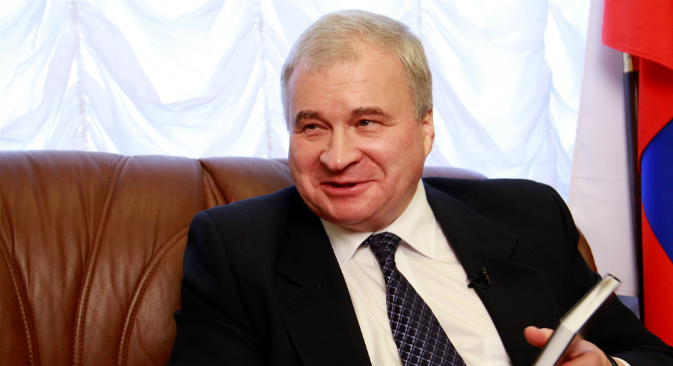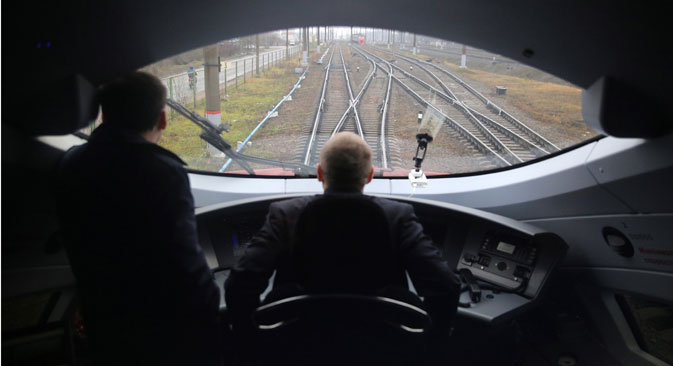Chinese economic corridor plans to aid Eurasian integration

Andrei Denisov. Source: Pavel Gazduk
RBTH: What are the key priorities in relations between Russia and China in the political and economic spheres today?
Andrei Denisov: In the political sphere, we have reached a very high level of strategic cooperation. There are few countries in the world – especially large and influential in world politics – whose leaders would meet at least five times a year. There is a fairly broad concurrence between our countries, or at least similar approaches towards major international issues. For example, the joint participation of Russia and China in the settlement of the Syrian crisis, which was effectively the prevention of a military attack against Syria, is perhaps the most telling example of the efficiency of this kind of interaction.
In 2014, the volume of trade [between China and Russia] – according to Chinese statistics – amounted to about $95 billion, coming close to the target that was set for 2015 by our leaders a few years ago, when it was planned to reach the level of $100 billion. Due to the crisis in the global economy, certain economic problems in our country, some minor but still noticeable slowdown of economic growth in China, and for us to a large extent due to the fall in world oil prices, the volume of trade may fail to reach the planned level of $100 billion this year. But no one makes numbers a fetish, since what's most important is the quality of the economy.
RBTH: Changes in the exchange rates of the Russian and Chinese currencies have already affected the volume and structure of trade between our countries. What can it lead to?
A.D.: Of course, changes in exchange rates affect the course of trade, it is inevitable, but when the economic and trade cooperation enters a certain, sufficiently high level, then eventually it is all somehow mitigate. I don't think that these market fluctuations and changes have too big an impact on our trade. Yes, there will be some rebuilding, there will be a change the structure, but the trade as a whole will continue to develop.
RBTH: Russia recently said it is joining the Asian Infrastructure Investment Bank. What benefits does the participation in the bank hold for Russia?
A.D.: Benefits for Russia stem from the very name of the bank – the Asian Infrastructure Investment Bank. Our challenge is qualitative improvement, I would say, abrupt rise of our infrastructure. Especially in the eastern part of our country – in eastern Siberia and the Far East. In our country, investment opportunities in terms of infrastructure are truly immense. How our Chinese partners tell us, Russia – considering not only its need for infrastructure investment, but also a high level of readiness to receive these investments – will certainly be one of the priority players in the investment market.
RBTH: What results does Russia expect from participation in the Silk Road Economic Belt project?
A.D.: The Silk Road Economic Belt is not just a transport corridor; it is a comprehensive and integrated economic development of vast areas along the natural routes of transportation of goods in one direction or the other. It is about the transportation of goods from East Asia to Western Europe and vice versa. And naturally this path goes, to some extent, through Russia.
Russia and the surrounding countries of the Eurasian Economic Union, which are Kazakhstan, Belarus and Armenia with Kyrgyzstan on the way, have their project of regional integration. And, as Russian First Deputy Prime Minister Shuvalov noted, speaking at an economic forum in Boao, our common task is to unite the economic opportunities of the Chinese Silk Road project and our economic integration project in the framework of the Eurasian Economic Union.
I would also note that we have our own infrastructure projects; this is the modernization of BAM [Baikal-Amur Mainline] and the Trans-Siberian Railway, which pass through our entire country. This program, at least from a theoretical perspective, can be well incorporated in the comprehensive strategy of the Silk Road. There is also another project, the Tea Horse Road– from the city of Wuhan to St. Petersburg through Kyakhta and Irkutsk. This interesting concept also fits into the overall integration projects in the broad Eurasian area.
RBTH: This year, we mark the 70th anniversary of Victory in the Great Patriotic War [World War II], while in September, China will hold celebrations in honor of the 70th anniversary of the victory over Imperial Japan. How strong, in your opinion, is the memory about the joint struggle of our peoples against fascism and militarism in China, especially among young people?
A.D.: The Anti-Japanese War left in the historical memory of the Chinese people, we can say, as deep an impression, as the Great Patriotic War did in the historical memory of our people. Mourning for those killed during the war, respect for the memory of the soldiers and officers, respect for the memory of the war years is sufficiently large in China, just as it is in Russia.
In the last two years alone, new public holidays were introduced in in China – September 3, the anniversary of the victory of the Chinese people in the Anti-Japanese War, and December 13, the day of memory and mourning – like June 22 in Russia – it is the day of the so-called Nanjing Massacre of 1937. We can say that the historical memory of the events of those years is alive, and, of course, both in Russia and China, it is the mission of departing generations to pass this memory to coming generations, that is to young people. And, on the whole, they succeed.
This interview was edited and condensed for clarity.
All rights reserved by Rossiyskaya Gazeta.
Subscribe
to our newsletter!
Get the week's best stories straight to your inbox
